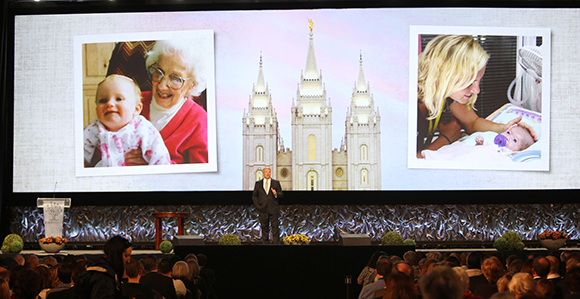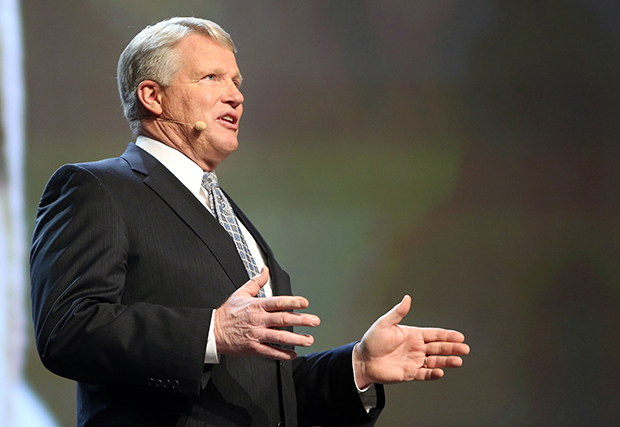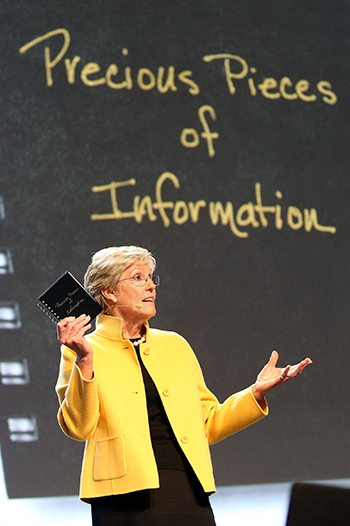Leaders Speak of Strengthening Relationships, Learning Stories during RootsTech Family Day
Contributed By Marianne Holman Prescott, Church News staff writer

Brother Stephen W. Owen speaks at the RootsTech conference at the Salt Palace Convention Center in Salt Lake City on Saturday, February 6, 2016.
Article Highlights
- Work on “the things that last," such as family relationships.
- Share ancestors' information with your family and on the FamilySearch Memories app.
“There’s no age requirement to be touched by the spirit of Elijah.” —Brother Stephen W. Owen, Young Men general president
Related Links
Relationships are important in God’s plan, Brother Stephen W. Owen, Young Men general president, taught during the family session of Family Discovery Day at RootsTech on February 6.
Joining him for the family session during the Saturday conference was Sister Rosemary M. Wixom, Primary general president. Elder Enrique R. Falabella, General Authority Seventy, introduced the speakers.
“There’s no age requirement to be touched by the spirit of Elijah,” Brother Owen said. “Any individual who shows even the smallest interest in family history work can open the door to blessings.”
Using the example of young men and young women he has met while in his assignment as Young Men general president, Brother Owen told of the great blessings youth have reported receiving because of their involvement in family history.
Whether it is an increase in love for their family, a deeper love for ancestors, or even the strength to overcome temptations, youth are beginning to understand the power and purpose of relationships in God’s plan, Brother Owen taught.
“Relationships are at the very core of the gospel of Jesus Christ,” he said.
Sharing tender experiences with his grandmother—both when he was a child and as an adult—Brother Owen taught of the importance of developing relationships with loved ones. He invited his daughter, Jessica, to the stage to share her story of her daughter, Annie, who was born with a rare genetic disorder that led to her death when she was four and a half months old.

Brother Stephen W. Owen speaks at the RootsTech conference at the Salt Palace Convention Center in Salt Lake City on Saturday, February 6, 2016. Photo by Kristin Murphy, Deseret News.
“Each of us can find comfort in the relationships we’ve developed and in the knowledge that those relationships are forever and transcend death. … I recognize that not everyone has had the opportunity to nurture and develop family relationships, but don't be discouraged,“ he said. ”Stronger relationships can begin with you, right now, where you are. Through all kinds of family history and temple work, you can increase in love and help your family heal going in both directions, toward your ancestors and toward your posterity.“
Every person, regardless of current family circumstances, can begin working on “the things that last,” Brother Owen taught.
“Maybe you’ve started your family history and have become discouraged because of damaged relationships or missing information,” he said. “Don’t give up. Keep seeking the eternal. Pray and look for connections, relationships, and stories. When you begin to find those personal connections—and they can be as simple as sharing physical features or personality traits with an ancestor—you’ll start to understand what it’s like to have your heart turn to your fathers; the gospel will have an opportunity to move from your head to your heart. You will feel for yourself the power and eternal nature of family relationships. … Because of Him, we can have relationships that endure, relationships that include our Heavenly Father, our Savior, and our loved ones.”
Sister Wixom taught there is strength in learning the stories of one's ancestors.

Sister Rosemary M. Wixom speaks at the RootsTech conference at the Salt Palace Convention Center in Salt Lake City on Saturday, February 6, 2016. Photo by Kristin Murphy, Deseret News.
She told of a time of when an Apostle asked her the question, “What is the taproot that will anchor a child in the wind?”
“To answer, we need to know that a taproot is the first and largest root that springs from the seed,” she said. “It grows downward and provides stability. Plants with taproots tend to be drought tolerant and can even store reserves of food, making them self-sufficient and resilient.”
“I believe that the taproot for our children—that will anchor them in the wind—is helping them see themselves in the great plan of salvation. … When children know who they are, where they came from, why they are here, and where they are going, their lives take on a sense of purpose, enabling them to grasp tightly to truth. … When they understand God’s plan for them, they will be stable, drought tolerant, self-sufficient, and, of course, resilient!”
Although all may not be experts in research strategies or have volumes of scrapbooks compiled over the years, all can be a part of creating family connections. As people know about family members who have gone before them, their ancestors become real people with real-life situations “who help us in times of need—especially when the wind is blowing.”
“How do we make our ancestors real?” she asked. “We tell their stories. Too much courage, faith, and real-life challenges have gone into their lives for us to let their examples dissolve like faded ink on paper.”
Sister Wixom shared two ways people can preserve and share precious pieces of their family history and provide the temple ordinances for those who are still waiting.
First, Sister Wixom encouraged listeners to take opportunities to share information with their family. Whether it is telling a story, comparing the family member to an ancestor, or teaching a lesson through a similar experience of an ancestor, sharing stories helps family members draw from the experience of their ancestor.
Second, Sister Wixom encouraged listeners to share their information on the FamilySearch Memories app.
“I can attach photos and stories,” she said. “As I submit these precious pieces of information online, others may connect the past to the present and continue to create an unbroken chain of memories.
“To know these pieces of information about our immediate family members who have gone before is one thing, but to climb into the branches of our family tree and discover names of those who are waiting for their saving ordinances is another step. Both are important elements of family history.”
